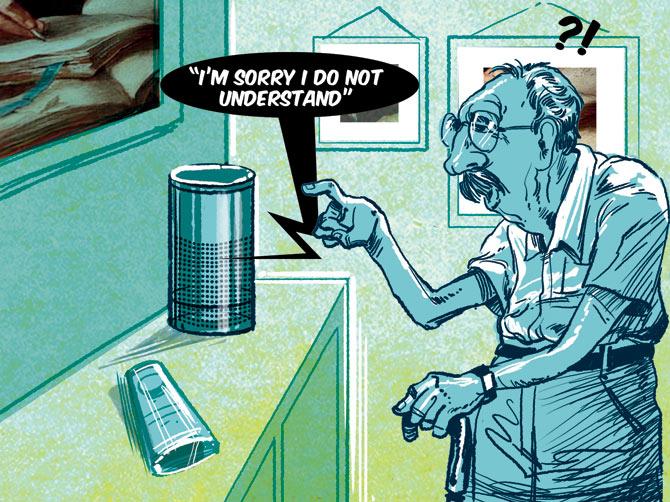My friend's father, Uncle R, is growing older. He is not entirely at ease with changing technology


Illustration/ Ravi Jadhav
ADVERTISEMENT
 My friend's father, Uncle R, is growing older. He is not entirely at ease with changing technology. We are familiar with this when it comes to older people in our lives. For instance, my mother takes to computers and social media, but resists ATMs. Some older people love Uber but hesitate before escalators.
My friend's father, Uncle R, is growing older. He is not entirely at ease with changing technology. We are familiar with this when it comes to older people in our lives. For instance, my mother takes to computers and social media, but resists ATMs. Some older people love Uber but hesitate before escalators.
Since Uncle R loves music, my friend decided to bring home Alexa, the artificial intelligence personal assistant who operates computers from your voice commands, in the hope that his father would be able to at least listen to music online. But Alexa and Uncle R have had a breakdown in communications. The reason? Courtesy.
"Perhaps if we'd called Alexa 'it' instead of 'she' it would be different," says my friend. Because Uncle R, thinking of Alexa as a person, finds it difficult and curt to say things like – Alexa play Uzr Aane Mein Bhi Hai by Begum Akhtar. Instead, he says, "Alexa?" pauses for a response, then adds, as any polite person might, "could you please play the Begum Akhtar song Hamari Atariya Mein…" by which time Alexa has begun to say "I'm sorry I do not understand" or whatever is the AI version of "hain?"
A lot gets written about how AI will change us. But how about the way we unquestioningly carry something of our attitudes into AI, thus missing the opportunity for reimagining the world not just functionally, but also emotively. For instance, that assistants — like Siri and Alexa, always ready to serve, respond, understand — are women has already been remarked upon. It seems the discussions around gender fluidity, therefore, haven't quite entered cutting-edge technology, which sometimes makes you wonder exactly what cutting-edge means.
It is somewhat beautiful is it not, that my friend's father wishes to speak to Alexa courteously? And, a little poignant that Alexa cannot cope with 'please' and 'thank you'? Sadly, this mirrors so much of contemporary interaction. I regularly receive emails from strangers commanding me to read their manuscripts, scripts, novels, poems and blog posts. Few – maybe one or two, without exaggeration – say would you 'please' read? Being a little old school on the manners front, I often reply to these emails, which my friends find stupid, not quaint, indicating this is an era where good manners are naiveté. When I have politely expressed my inability the responses are: no reply, curt reply (ok, fine), or rude reply ('then you should not have a website which gives the impression of a friendly person' said one, yaniki 'you are a hypocrite for not serving my purpose', apparently the purpose of friendliness). It is as if access to an email id or cell phone number converts us into a kind of Alexa who can be commanded to give in to the other person's demands, irrespective my time or inclination.
This feels closely allied to the idea that we are our social media personae, a kind of incipient AI, which seems to facilitate a violently rude and unkind culture of political disagreement and trolling. The need for good manners is dismissed as old-fashioned. But courtesy is a technology too. A social technology, which can engender egalitarianism, and a public culture with the potential for respect and humanity woven into its interaction.
So here I am, dreaming of an AI that responds to people who mind their Ps and Qs.
Paromita Vohra is an award-winning Mumbai-based filmmaker, writer and curator working with fiction and non-fiction. Reach her at www.parodevipictures.com
Catch up on all the latest Mumbai news, crime news, current affairs, and also a complete guide on Mumbai from food to things to do and events across the city here. Also download the new mid-day Android and iOS apps to get latest updates
 Subscribe today by clicking the link and stay updated with the latest news!" Click here!
Subscribe today by clicking the link and stay updated with the latest news!" Click here!







